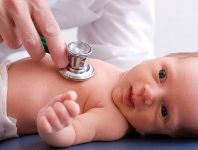Article
Study Explores Infliximab's Effects on Kawasaki Disease
Author(s):
To curb the symptoms associated with Kawasaki Disease, researchers are recommended use of the drug infliximab, according to a study published online in the February 24 issue of The Lancet.

To curb the symptoms associated with Kawasaki Disease (KD), researchers are recommended use of the drug infliximab, according to a study published online in the February 24 issue of The Lancet.
KD damages the coronary arteries and can lead to serious heart problems in early adulthood. Symptoms include red eyes, mouth, lips, and tongue, and swollen hands and feet with peeling skin. Nearly a quarter of infected children are misdiagnosed, with parents and some doctors believing it to be a viral infection.
Treatment for KD includes a combination of intravenous immunoglobulin (IVIG) and aspirin. While IVIG is integral at preventing aneurysms, 10 to 20 percent of patients experience relapse leading to additional treatment.
Adriana H. Tremoulet, MD, and colleagues at the University of California-San Diego and Rady Children’s Hospital-San Diego Kawasaki Disease Research Centerconducted a randomized, double-blind trial that observed 198 children under 17 diagnosed with KD.Half of the patients were prescribed infliximab, while the remaining half as given a placebo.
The researchers found that while additional treatment rate was unaffected under infliximab, there werebenefits to using the drug.
“Treatment resistance rate did not differ significantly (11 [11·2%] for infliximab and 11 [11·3%] for placebo; p=0·81). Compared with the placebo group, participants given infliximab had fewer days of fever (median 1 day for infliximab vs. 2 days for placebo; p<0·0001),” the authors wrote.
The investigators further claimed that infliximab “reduced fever duration, some markers of inflammation, left anterior descending coronary artery Z score, and intravenous immunoglobulin reaction rates.”The researchers also claimed that there were no observed adverse reactions to infliximab.
“We conclude that use of infliximab is safe in infants and children and that early treatment could help children with Kawasaki Disease with high levels of inflammation or early signs of coronary artery damage,” Tremoulet said in a statement.


